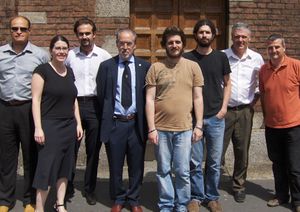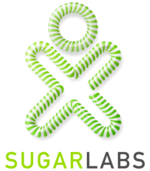Welcome to the Sugar Labs wiki
| english | español | português brasil | پښتو | HowTo [ID# 7555] |
Sugar reinvents how computers can be used for education. Sugar promotes sharing, collaborative learning, and reflection. Through Sugar's clarity of design, children and their teachers have the opportunity to use computation on their own terms; they are free to reshape, reinvent, and reapply both software and content into powerful learning activities. Sugar is a community project; it is based on GNU/Linux, a free and open-source operating system.

Sugar facilitates sharing and collaboration.
Children write documents, share books and pictures, or make music together with ease.

There are no files, folders, or applications.
The basic unit of interaction is an activity; it includes an application, data, and a history of the interaction that can be used to resume the activity at any time.

It is almost impossible to lose data.
Everything is saved and backed up automatically.

A Journal is used for accessing data.
The Journal is a diary of things that you make and actions you take; it is a place to reflect upon your work.

Sugar is free and open-source software.
Sugar is licensed under GPL; updates will always respect the freedom of its users.
Latest news
- Sugar wins a silver medal in the International Design Excellence Awards '08 (See [1])

- Minutes from the Sugar Labs meeting in Milan on 30 June 2008.
- A draft proposal for a governance model for Sugar Labs has been posted to the wiki (Please see the governance page). Feel free to make corrections and add comments.
- Sucrose 0.81.2 (Development Release) has been released.
- Wolfgang Rohrmoser reports that a new release (080607) of the Livebackup XO-LiveCD is available (XO-LiveCD).
For more news about Sugar Labs, please see visit the Current Events page.
What are the Sugar Labs?
Sugar is available under the free software GNU General Public License (GPL) to anyone who wants to extend it. “Sugar Labs”, a (soon to be established) non-profit foundation will serve as a support base and gathering place for the community of educators and software developers who want to extend the platform and create Sugar-compatible applications. Sugar Labs software is found on the XO laptop. You can find more out about the project at laptop.org.
Learn more about Sugar... or learn about Sugar Labs, the organization behind Sugar
Get involved in the Sugar development and community efforts.
Getting Sugar
There are many ways to run Sugar: as a separate disk image on an existing machine; as a session on a Linux distribution; or as part of a complete hardware-software platform.
Activities
Sugar applications are called Activities. This is a list of some Activities that are installed by default. There is a proposal for an Activity portal.
JournalObject and activity browser |
PippyPython Programming language/environment |
BrowseWeb browser based on Mozilla Firefox |
EtoysLearning / programming / authoring environment |
ReadBook/PDF reader |
Turtle ArtPseudo-Logo graphical programming language |
WriteWord processor |
CalculateBasic calculator |
News ReaderNews reader |
MeasureOscilloscope and Data Logging |
PaintSimple paint activity |
DistanceMeasure distance between two laptops |
RecordStill, video, and audio capture |
AnalyzeAn activity version of the Sugar analyze tool |
LogAn activity version of the Sugar logging tool |
TerminalAn activity version of the Sugar terminal |
TamTamMusic composition and synthesis. |
ChatCollaborative discussion |
And more |
See also

- Getting involved!
- A Sugar taxonomy and a matrix of supported systems
- The Sugar ReleaseTeam and ReleaseTeam/Roadmap discussion pages
- Other pages of interest to developers
- A background discussion on Sugar and Sugar Labs
- The Sugar category on olpcwiki for more.
- Help us design a logo for Sugar Labs
- Frequently asked questions